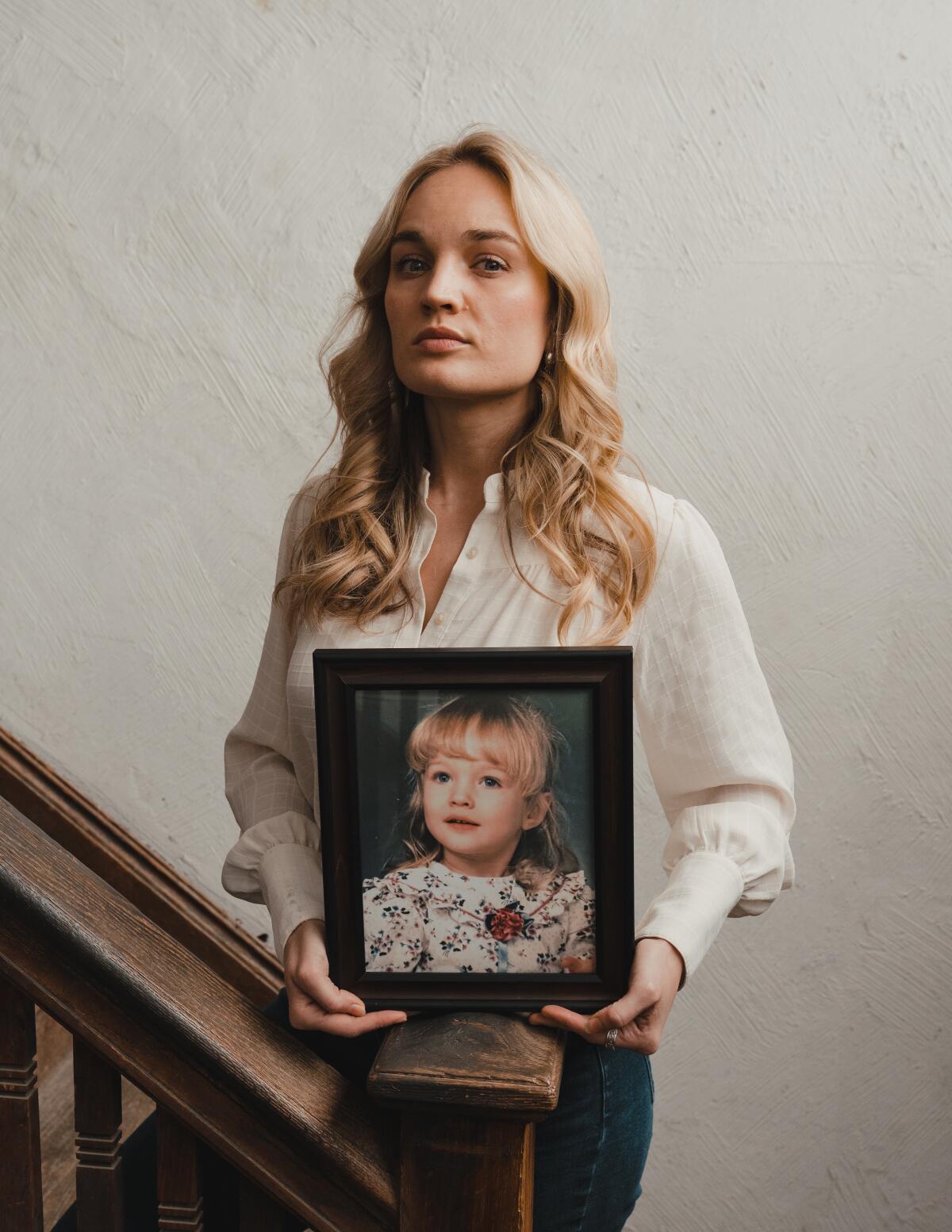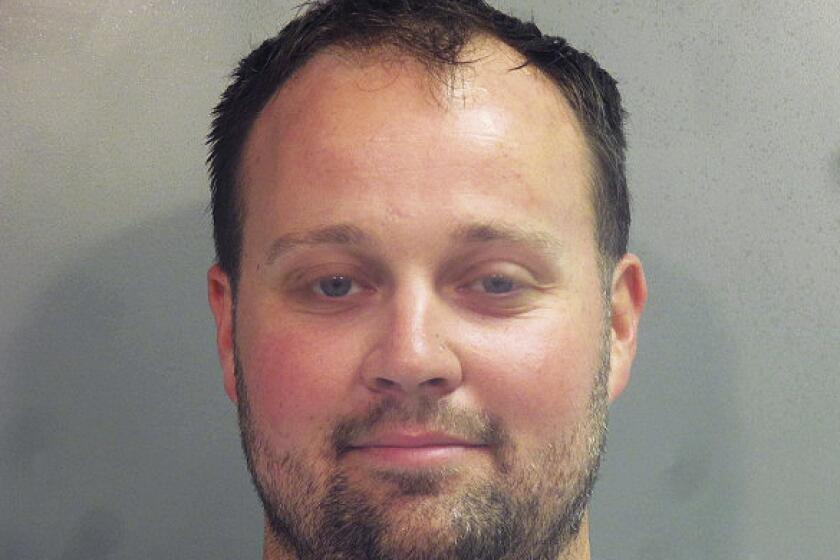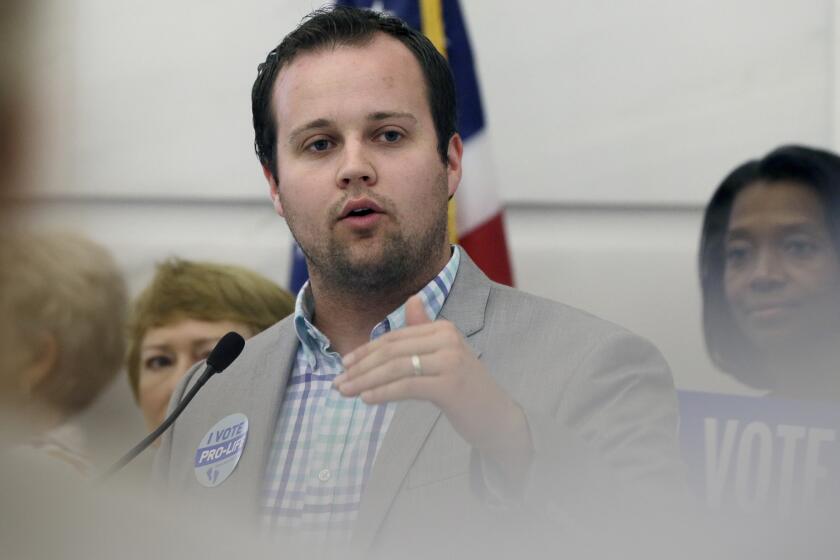TLC cast her 14-person family in its reality empire. Behind the scenes, it was ‘life and death’

NEW YORK — When Jessica Willis Fisher was in her early 20s, her life looked different from that of most people her age. Instead of expanding her mind in college or partying with friends, Fisher was the unwitting star of a reality TV show that presented her family in a deceptively wholesome light.
“The Willis Family,” which premiered on TLC in 2015, featured the telegenic family of 14 — parents Brenda and Toby, plus 12 children who performed in a band and had names beginning with the letter “J.” Like “The Partridge Family” meets “19 Kids and Counting,” the show followed the Willises as they toured the country and lived according to strict religious beliefs: the kids were homeschooled, birth control was forbidden and casual dating was out of the question.
Fisher, a sunny, fiddle-playing blonde and gifted singer-songwriter, was the eldest child in the family and the unofficial leader of the group, known as the Willis Clan, which had risen to fame through a “Sound of Music”-themed contest on “Today” and a successful run on “America’s Got Talent.”
Josh Duggar’s conviction on child pornography charges is the latest scandal involving alleged child sexual abuse by people linked to TLC programs.
They were, in short, a perfect fit for TLC, which became a cable powerhouse with popular shows about large, conservative Christian families such as the Duggars of “19 Kids and Counting” and the Gosselins of “Jon & Kate Plus 8.” For a brief moment, “The Willis Family” seemed poised to be the network’s next big hit, garnering more than a million viewers a week in its first season.
The facade crumbled overnight in September 2016, when family patriarch Toby Willis was arrested on charges of child rape. He eventually pleaded guilty to four counts and was sentenced to 40 years in prison. In a statement at the time, TLC said it was shocked by the news and had made the decision to cancel the show prior to Willis’ arrest.
As Fisher, 30, details in a harrowing new memoir, “Unspeakable: Surviving My Childhood and Finding My Voice,” she was one of her father’s victims, enduring sexual abuse that began when she was 3 or 4 years old — and didn’t yet have the words to describe what was happening to her — and continued for more than a decade.
The book paints a picture of a violent, narcissistic patriarch who ruled over his family like an apocalyptic cult leader and saw his talented children as a path to fame and fortune. But it is also a tale of resilience, chronicling Fisher’s efforts to escape her family at the height of their reality TV fame, bring her father to justice and move on from her traumatic childhood.

“I needed to tell my story,” said Fisher as she sat in a quiet hotel lounge in Times Square on a recent afternoon, a few blocks away from Radio City Music Hall, where nearly a decade ago the Willis Clan charmed the “AGT” judges with their folksy covers of hits by Huey Lewis and others. “It’s been a healing process to reclaim things. When your image, your voice, all your talents — you, as a person — are tied up in one story, you want to tear it down and replace it with the truer, realer story.”
That story begins in Chicago, where Fisher grew up in a household defined by rigid fundamentalism. “I was taught a woman’s lot in life is first to be subject to her father, and then, after marriage, to her husband,” she writes.
Tragedy cast a long shadow over the family: In 1994, six of Toby Willis’ younger siblings were killed in a horrific van accident. His parents eventually received a $100-million settlement and gave him a portion of the money, which he used to relocate his growing family to an idyllic 100-acre property near Nashville.
In one of Fisher’s earliest memories, her father touched what she describes in “Unspeakable” as “a part of my body I don’t have a name for.” The behavior escalated as her parents kept having children, one after another, adding to the already chaotic environment at home. In one incident she recalls with crystalline detail, Willis pulled her out of bed, carried her to the bathroom and assaulted her on the tile counter as her mother and siblings slept down the hall.
As a coping mechanism, Fisher imagined a silent, invisible version of herself with a black box to stuff her feelings into. That way, she writes, “I could go on smiling, being special, and making Dad happy.”
‘iCarly’ and ‘Sam & Cat’ star Jennette McCurdy says in her new memoir that Nickelodeon offered her $300,000 not to talk about her experiences there.
There were periods when Toby Willis, fearing detection, would rein in the abuse, only to begin again — a pattern that continued until Fisher was about 16. In “Unspeakable,” Fisher describes the verbal and physical abuse Willis inflicted on his wife and children, and recalls the agony of learning she was not the only victim of sexual abuse in the household. (Although Willis’ underage victims were not identified during his legal proceedings, several of his daughters have since come forward as survivors.)
Fisher escaped by reading — “Little Women” and “The Lord of the Rings” were favorites — and, later, by writing and playing music. After a failed attempt to start a professional wrestling league, Willis pushed his kids into performing. First there was competitive dance, then a family band that released multiple albums of Irish and bluegrass music and eventually became regulars at the Grand Ole Opry.
As their fame steadily grew, Willis’ beliefs “metastasized into the most unhealthy, extreme thing,” Fisher said. He spurned traditional church for a home fellowship where women were discouraged from speaking, amassed a slew of AR-15s and frequently invoked the 1992 siege of Ruby Ridge as an example of the extreme measures the family might need to take in order to defend itself.
The laws of gravity were just different in her family, Fisher said. “I couldn’t even conceive of a world in which Dad wasn’t the one in control.”
To achieve his grandiose dreams, Willis became determined to put his family members on television — even though they were largely forbidden from watching it. “When I questioned why we were doing TV, Dad said it was God’s will for our family,” Fisher writes. First came “The Willis Clan,” a short-lived reality show on Great American Country, a cable network; after that show ended came the “Today” show contest and a stint on “America’s Got Talent,” which in turn caught the attention of TLC.

“The Willis Family” followed the brood as they traveled to gigs and visited local attractions wherever they might be. It was bizarre to act out the inane, sitcom-style storylines the producers came up with for each episode — such as burning a cake — given the reality, Fisher said: “All of that was literally made up for the cameras. Meanwhile, there’s life and death stuff going on.”
Shows such as “The Willis Family” tap into “nostalgia for the way we never were,” Fisher continued. “A lot of people have been taught there’s an ideal — having a large family living according to conservative beliefs. When you see someone living that out, it’s like a shining beacon you can all aspire to. And a lot of people aspired to what we were saying we were. The truth is, we weren’t.”
In fact, as the cameras rolled on Season 2, the family was unraveling. Motivated by a painful discovery about her father’s behavior, Fisher began to plot her escape, though it would ultimately take her almost a year to extricate herself from the family.. She had also fallen in love with the man who would become her husband, Sean Fisher, but her parents forced her to break off the relationship. A production assistant on “The Willis Family” secretly mailed letters to Sean on her behalf and even helped her sneak some cherished belongings out of the house.
Fisher finally left in April 2016, unsure how she would make a living as a 24-year-old without a high school diploma or conventional employment history. “The last thing Dad said to me that day was, ‘When you mess up your life, and you come crawling back, we’ll forgive you,’” she said.
Months later, a family friend reported his suspicions about Willis to a sexual abuse hotline, triggering an immediate investigation. Fisher sat for a lengthy interview with the Tennessee Bureau of Investigation, detailing abuse that went on “night after night, for years.” Her account proved pivotal, enabling authorities to issue an arrest warrant for one count of child rape. Willis fled the state but was apprehended in Kentucky within days.
In a 2018 blog post, Fisher came forward publicly as a survivor for the first time, prompting a flood of outreach from people raised in other large, controlling families, but until the publication of “Unspeakable” this month, she had not shared the details of her story with a wider audience. Instead, she has been focused on therapy and recording her first solo album, “Brand New Day,” released on her 30th birthday in April and inspired by her musical heroes Emmylou Harris and Alison Krauss.
Despite deep-seated misgivings about the institution, Fisher has been married to her husband, Sean, for five years. She has also maintained a positive relationship with most of her family, including her mother, who was supportive of the book. “I’m trying as much as possible just to tell my story,” she said, adding that she is “very aware that they have their own different stories within that complicated system.” Less certain are her religious beliefs: Having cast off the teachings of her childhood, Fisher says she is still trying to find a church where she feels safe.
Jinger Duggar Vuolo thanks TLC after ‘Counting On’ gets the ax. The network says the family can handle Josh Duggar’s child-porn charges ‘privately.’
She continues to read voraciously, lately immersing herself in memoirs by women whose experiences echo her own, including “Uncultured: A Memoir,” by Daniella Mestyanek Young, about growing up in the Children of God cult, and “I’m Glad My Mom Died,” about Jennette McCurdy’s experiences as a child actor with an abusive mother.
Fisher has thought a lot about the ethics of reality TV, particularly shows featuring children with little say in how they’re depicted. Willis’ conviction is part of a troubling pattern at TLC: Several people with ties to the network have been accused of child sex abuse, most notably Josh Duggar, who was convicted on child pornography charges and sentenced to more than 12 years in prison.
“It’s really disturbing to see what we sometimes platform,” she said. “We need to ask, what is the level of responsibility that we all have? Am I doing anything to support what I see happening here, whether it’s just clicking on the TV? My dad was making money off of us. There were children involved who did not have a choice. And I don’t think that’s OK.”
There are times when Fisher contemplates the hypotheticals: What if she hadn’t gotten out? What if her dad fled the country with her siblings or used the weapons he stockpiled? Would this have led to “a Jonestown situation,” as she put it?
Fisher believes that privilege plays a part in her story — that people were more sympathetic because “we presented this ideal image of young, white smiling faces,” she said.
Mostly, though, she feels lucky to have beaten the odds.
“That wouldn’t have been a word I was allowed to use growing up, because there was no such thing as luck; it was all God’s will,” she said. “But it still feels like the best word.”
More to Read
The complete guide to home viewing
Get Screen Gab for everything about the TV shows and streaming movies everyone’s talking about.
You may occasionally receive promotional content from the Los Angeles Times.









